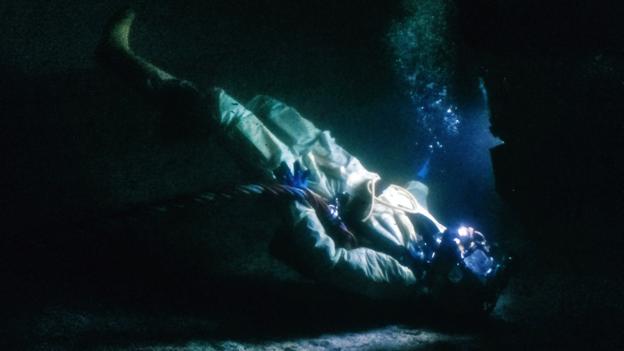Can you survive if you run out of air?
Companies, agencies, institutions, etc
Worst Case
BBC Future
Allcock
divers’
ROV
Portsmouth University
Youasa
Mount Everest
Lemons
the Norwegian University of Science and Technology (NTNU
Bajau
the University of Utah
actions.“One
BBC Scotland
Facebook
Culture, Capital
Travel
People
Chris Lemons
Moon
Getty
Morag Martin
Dave Youasa
Duncan Allcock
Bibby Topaz
Dogwoof
Bibby Topaz’s
Last Breath
Mike Tipton
away.“I
Mike Tipton Lemons
Ingrid Eftedal
Melissa Ilardo
Saluan
Groups
Lemons
Physical locations
the North Sea
Places
the Huntington Oil Field
Locations
Aberdeen
Scotland
UK
Trondheim
Indonesia
Bajau
Instagram
Events
No matching tags

Summary
This vital umbilical cord to the world above carried power, communications, heat and air to his diving suit 100m (328ft) below the surface of the sea.Worst Case ScenarioThis article is part of a new BBC Future column called Worst Case Scenario, which looks at the extremes of the human experience and the remarkable resilience people display in the face of adversity.It aims to look at ways people have coped when the worst happens and what lessons we can learn from their experiences.While his colleagues remember the terrible noise of this lifeline breaking, Lemons himself heard nothing. Over the next 30 minutes at the bottom of the North Sea, Lemons would experience something that few people have lived to talk about: he ran out of air.You might also like:• What happens when the food runs out?• How and why religion evolved• The attack that made me a maths genius“I’m not sure I had a full handle on what was happening,” recalls Lemons. A kind of resignation came over me, I remember being taken over by grief in some ways – Chris Lemons “It is a very strange situation,” says 39-year-old Lemons. “You are living on the ship surrounded by lots of people who are just a sheath of metal away, but you are completely isolated from them.“It is quicker to get back from the Moon than it is from the depths of the sea in some ways.”Decompression is necessary because nitrogen gas from the air divers breathe while underwater dissolves into their blood stream and tissues when they are at depth. The three climbed into the diving bell, which would be lowered from the ship, the Bibby Topaz, to the sea bed where they would carry out their repair work.“In many ways, it was just an ordinary day at the office,” says Lemons. Normally dive vessels use computer-controlled navigation and propulsion systems – known as dynamic positioning – to keep them over the dive site while they have people in the water.As Lemons and Youasa began repairing the piping underwater, with Allcock supervising them from the bell, the Bibby Topaz’s dynamic positioning system suddenly failed. Without oxygen, the human body can only survive for a few minutes before the biological processes that power its cells begin to fail “When I got there, the bell was nowhere to be seen,” says Lemons. As they drifted further away, they launched a remote-controlled submarine in the hope of finding him.When it did, they watched helplessly on its cameras as Lemons’s movements gradually stopped, his life fading away.“I can remember pulling the last bits of air from the tank on my back,” says Lemons. It is thought to be the reason why people report seeing a light at the end of the tunnel in near death experiences.” Children and women are more likely to survive because they are smaller and their bodies tend to cool much faster – Mike Tipton Lemons himself survived his time without oxygen unscathed. It is possible that the slow-down of oxygen transport in Lemons’s body allowed it to make the meagre supplies it had last longer.Exercising before diving has also been shown to help reduce the risk of developing the bends.Studies of indigenous people who habitually free dive without additional air have also shown just how much the human body can adapt to life without oxygen. With larger spleens, it is thought the Bajau benefit from a greater injection of oxygenated blood and so can hold their breath for longer The spleen is thought to play a key role in enabling humans to free dive.“There is something called the mammalian dive reflex, which in humans is triggered by the combination of holding your breath and submerging yourself in water,” says Ilardo.
As said here by Richard Gray